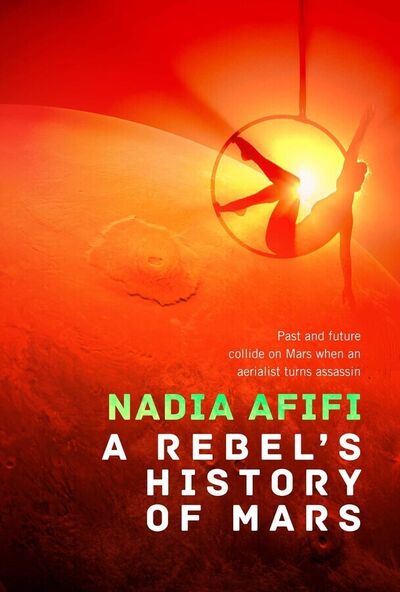Follow Me
A Rebel’s History of Mars
By Nadia Afifi

13 Jun, 2025
Nadia Afifi’s 2025 A Rebel’s History of Mars is an upcoming science fiction novel.
Orthodox Nabateans like Azad live happily constrained lives. Few choices burden them. Few find cause to complain… if only because those who do complain are efficiently whisked off to prison.
Azad’s cossetted life ends abruptly when a dying patient arrives at his workplace, Central Nabatean Hospital.
There are two kinds of Nabatean humans, Orthodox and Vitruvian. The Orthodox are standard-model anatomically modern humans. The Vitruvians are enhanced, more durable, and (as they often find cause to remind their lesser cousins), clearly cognitively superior to the Orthodox.
The Vitruvian woman who stumbles into the hospital has nothing wrong with her that the machines can detect. Nevertheless, she is clearly dying. In short order she is dead.
A Vitruvian dying on an Orthodox’s watch is potentially calamitous for the Orthodox. Azad should be overjoyed to learn that not only will he not be held responsible, that the whole matter will be a close-held secret of people more senior than Azad. However, Azad focuses on the dead woman’s last words to Azad: “You look just like her.”
There is only one her who resembles Azad: his twin sister Ledo. Ledo is one of the minority of Orthodox unhappy with convention. Ledo left the planet Nabatea years ago. Azad has long assumed Ledo was either dead or brain-wiped. Ledo may be alive.
A short but decisive sequence of lucky coincidences and dubious life choices follows. Conventional Azad abandons all propriety and sets out to find his sister. This will draw Azad into unsanctioned archaeological research.
More than a thousand years before Azad, Kezza ekes out a miserable life as a circus performer in Calypso Corporate Campus, Mars. Kezza is painfully aware she can never return to Earth because Mars gravity has left her too frail. Kezza also has little hope for reform. That leaves vengeance.
Famed civilizationist1 Barrett Juul is the oligarch whose golden words convinced Kezza’s father to move his family to Mars. Juul is scheduled to visit Calypso. When he arrives, Kezza plans to kill him. How she will accomplish this is a minor detail to be worked out on the day.
What Kezza does not expect is that Juul has a bold plan to colonize the exoplanet Nabatea, that there’s a possible role for Kezza, or that Juul can be convincing enough to sway Kezza. Life is full of surprises.
What was the path from Kezza’s Mars to Azad’s Nabatea? What are the true origins of the Vitruvians? Why are Vitruvians dying? Why does the archaeological evidence recently discovered not line up with the official history? What has Leda to do with all this? And most importantly, are any of those questions ones that Azad can survive asking?
~oOo~
I wish the author had had asked someone to vet her space stuff. There’s a tide-locked moon with a dark side and a day side, and at one point, a space craft encounters an asteroid belt near Venus. Neither matters to the plot and both slips are easily fixed.
Afifi makes a creative decision I didn’t understand. Azad’s part of the story involves him and his new allies recapitulating archaeological research Leda and her friends had already conducted. Why not drop Azad and focus on Leda? Was it to show the process of disillusionment from the perspective of a true believer?
One of Juul’s (and thus, Nabatea’s) firmly held beliefs is that the average person is happiest when they can choose from a limited number of clearly defined alternatives. On Nabatea, Orthodox are frequently offered three alternatives to choose from. Two are socially acceptable. One will get the Orthodox flagged as a potential problem. Choose judiciously!
Many SF settings combine thriving exoplanet colonies with dead or greatly damaged Earths. This setting is one of those2. In fact, by Azad’s time, the Mars colonies are dead as well. Where the setting of this novel differs from most others is in the histories of how Mars and Earth came to be as they are, which I cannot discuss as that would be a spoiler. Nevertheless, the explanation is not “the Old World folk were degenerates who perished when all the naturally superior frontier folk left”… which is a nice change.
A Rebel’s History of Mars is available here (Flame Tree Press), here (Barnes & Noble), here (Bookshop US), here (Bookshop UK), here (Chapters-Indigo), and here (Words Worth Books).
1: Never formally defined but clearly a grand or at least adored social visionary.
2: USA delenda est.
